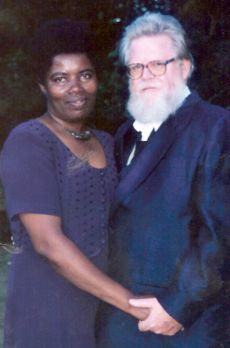Diferencia entre revisiones de «Usuario:Philbartle»
De WikiEducator
m |
(→Los sermones de Phil) |
||
| Línea 68: | Línea 68: | ||
Mis pensamientos ocasionales sobre el WikiEducador y su comunidad | Mis pensamientos ocasionales sobre el WikiEducador y su comunidad | ||
| + | |||
| + | * '''Epistemology''': It might be time to add a few questions about epistemology (how we know) to our discussions on WikiEducator. Lots of good debate on "How do we learn?" and its converse (but not its mirror image), "How do we teach?" Now we should ask, "How do we know?" If we learn something, how do we know when we know? If we teach something, how do we know that the taught know? | ||
| + | :◊ In classical Epistemology we have only four ways of knowing: (1) Observing (sensing, empiricism), (2) Logic (calculating, reason), (2) Belief (faith, worldview), and (4) Authority (Mommy said so). While we educators pay much lip service to our students discovering for themselves (by logic or observation), we rely considerably instead on Authority (because we, or the text book, said so). | ||
| + | :◊ There are issues, problems and criticism for each of the four ways. Observation: we have no way of being certain that what you sense is what I sense, even if we give it the same name, and no objects, including observers, can occupy the same space at the same time, so everyone has a unique observational experience. Reason: There is nothing intrinsic abut two when we see two apples; the "twoness" is in our minds. Belief: If you do not believe in dwarves, that makes you a dwarf atheist. Authority: prosilitisers for a particular belief cite some Authority, usually a book, omitting to mention that all books are written by human beings. | ||
| + | :◊ Now how does all this relate to open and free educational resourses, which is what we are all about? Is learning different for the four ways? Should our teaching be different? I once taught at a seminary and noticed then that the teachers of religion ("our kind" of course) did not like to take a critical and epistemological look at beliefs, like the creed, or that God exists, because Authority and belief have neither logic nor witness to back them up. No wonder they talked about sheep as a role model. | ||
| + | :◊ We often forget that there is no finite amount of right knowledge, and what we know as a society constantly changes. There is no right answer. Administrators in schools and colleges, however, ask us for a course outline that portrays a finite quantity of information as the curriculum. There is no curriculum! | ||
| + | :◊ What is the lesson to be learned here? The solution? We should always promote unorthodox methods of learning and teaching on WikiEducator and in the classroom. Those lacking courage and creativity will revert to the orthodox. Not all new methods will work, but a key feature of WikiEducator is collaboration. We can help each other in developing new methods. Let us keep on so long as we are having fun. --[[User:Philbartle|Phil Bartle]] 07:32, 20 August 2009 (UTC) | ||
* '''Education and Empowerment'''. An important element of the reasoning behind community empowerment is that charity weakens. If we do everything for a poor community, then it does not get stronger. It becomes dependent upon our charity. This is not universal. There are times and places where charity is necessary and does not weaken. During a disaster, emergency response requires charity to ensure the people can survive (but it must end when it should). If a person becomes blind, it would be charity to read to that person, and that does not make the person more dependent. Most of the Aid to Africa, especially bilateral (government to government), in contrast, is based on charity, and it encourages corruption, inefficiency, and it releases more resources for war and oppression. | * '''Education and Empowerment'''. An important element of the reasoning behind community empowerment is that charity weakens. If we do everything for a poor community, then it does not get stronger. It becomes dependent upon our charity. This is not universal. There are times and places where charity is necessary and does not weaken. During a disaster, emergency response requires charity to ensure the people can survive (but it must end when it should). If a person becomes blind, it would be charity to read to that person, and that does not make the person more dependent. Most of the Aid to Africa, especially bilateral (government to government), in contrast, is based on charity, and it encourages corruption, inefficiency, and it releases more resources for war and oppression. | ||
Revisión de 23:52 20 ago 2009
|
Български Deutsch English Français Polski Português Romãnã Pyccкий Tagalog Just try it; we (your community) will support you.
ContenidoLos sermones de PhilEl atleta no se hará más fuerte Traducido por Cristina Varela Mis pensamientos ocasionales sobre el WikiEducador y su comunidad
UtilitidadesToday is: 2024 noviembre 25, lunes Contactos frecuentesOur little band, y amig@s de Potenciacion Comunitaria
Tips and SuggestionsComentarios de mis WikivecinosPor favor, escribe tus comentarios en la sección de Debates. Pincha en "Debate" en la parte superior de esta página.--Phil Bartle 03:07 3 may 2009 (UTC) |
||||||||||||||||||||||||||||||||||||||


